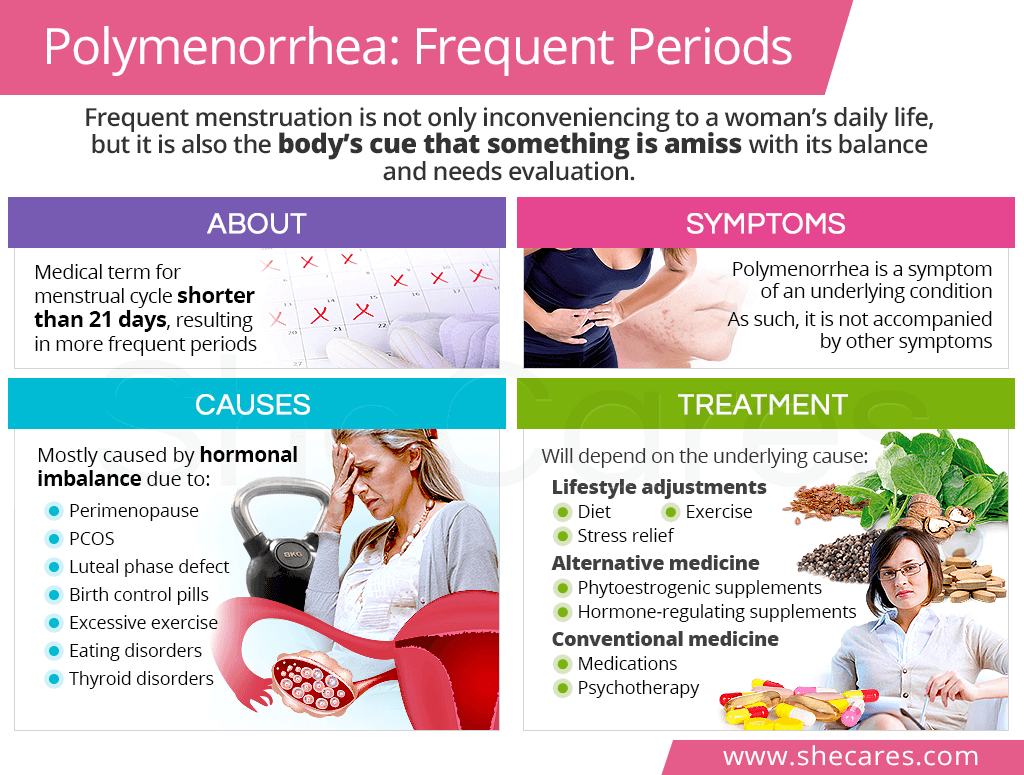About Frequent Periods
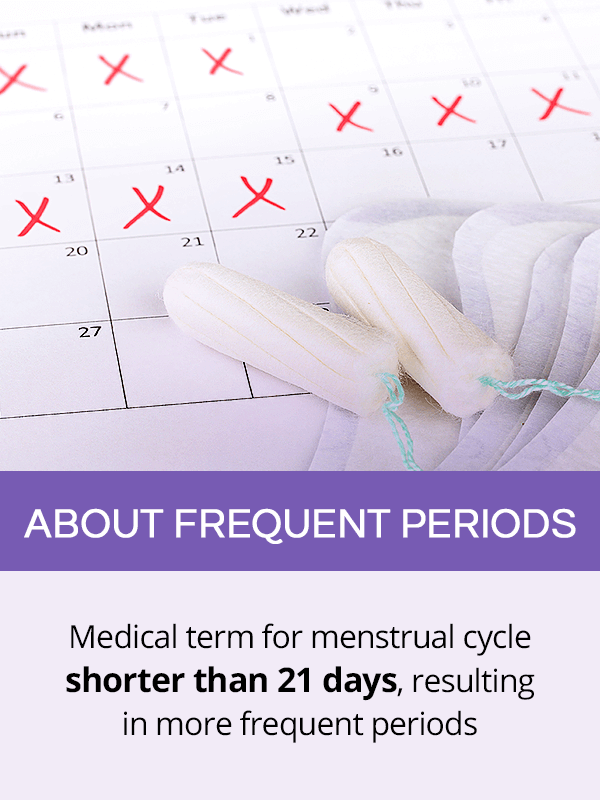
Polymenorrhea is a medical term for short menstrual cycles, which are defined as those that last less than 21 days.1 As such, a woman has more frequent periods, often around 20 per year as opposed to 9-12 in healthy menstruation.2
For reference, a healthy menstrual cycle is defined as one that lasts between 21 and 35 days, with bleeding lasting for 3-7 days.3
Consequently, frequent menstruation is generally classified as irregular periods, or abnormal uterine bleeding. It is one of the most common menstrual disorders, requiring proper evaluation and treatment.
Short Cycle Symptoms
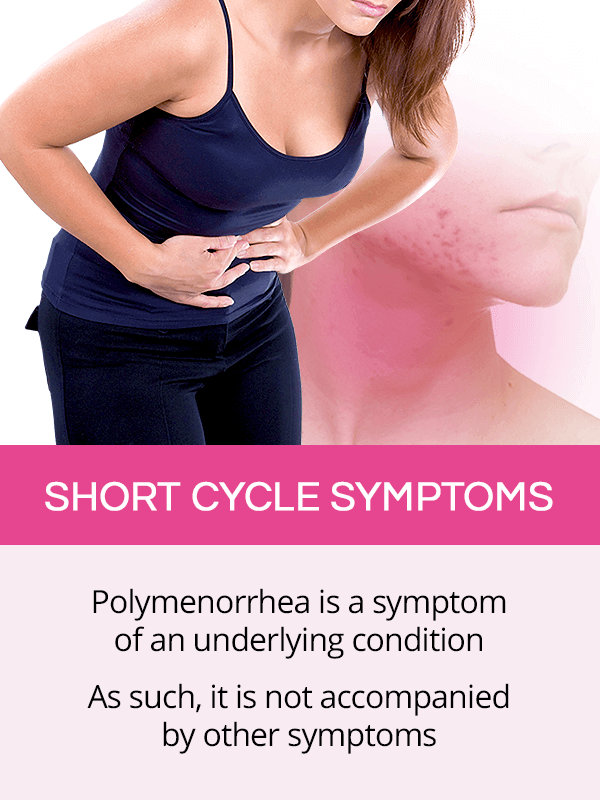
Besides experiencing more frequent menstruation, there are no other symptoms associated with polymenorrhea.
However, it is important to keep in mind that short cycles are a symptom of an underlying disequilibrium in the body. As such, they might be accompanied by other characteristic symptoms, including:
Short Menstrual Cycle Causes
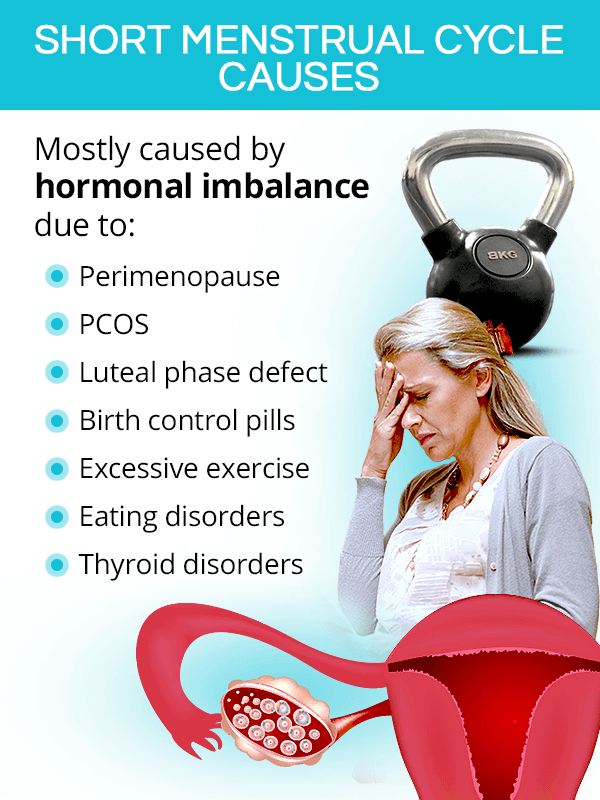
Most cases of frequent menstruation share the same underlying cause, hormonal imbalance, which can be brought about directly and indirectly through lifestyle habits or medical conditions.
The most common causes of frequent periods include, but are not limited to, the following:
- Luteal phase defect
- Prolonged stress
- Endometriosis
- Premenopause
- Thyroid disorders
- Excessive exercise
- Polycystic ovary syndrome (PCOS)
- Sexually transmitted diseases (STDs)
- Hypothalamic or pituitary disorders
- Diabetes
- Excessive or insufficient body fat
- Eating disorders
- Uterine fibroids or cysts
- Birth control
Frequent Periods Risks & Effects
Having more frequent periods than what is considered healthy can have negative repercussions on a woman's overall and reproductive health, including the following:
Anemia
Frequent menstruation can commonly lead to anemia due to increased blood loss on a monthly basis.4 When blood does not have enough red cells, oxygen transport is compromised, leading to fatigue, low energy, and other symptoms.
Infertility
Women with short cycles might have difficulty determining their fertile window as it can coincide with their bleeding days. Others might struggle with ovulation problems, including absent or infrequent ovulation, leading to infertility.
Miscarriage
It is also possible that a woman with polymenorrhea has a short luteal phase - the second part of the menstrual cycle after ovulation - which might not allow sufficient time for implantation to take place, thus leading to a miscarriage.5
Short Cycle Treatment
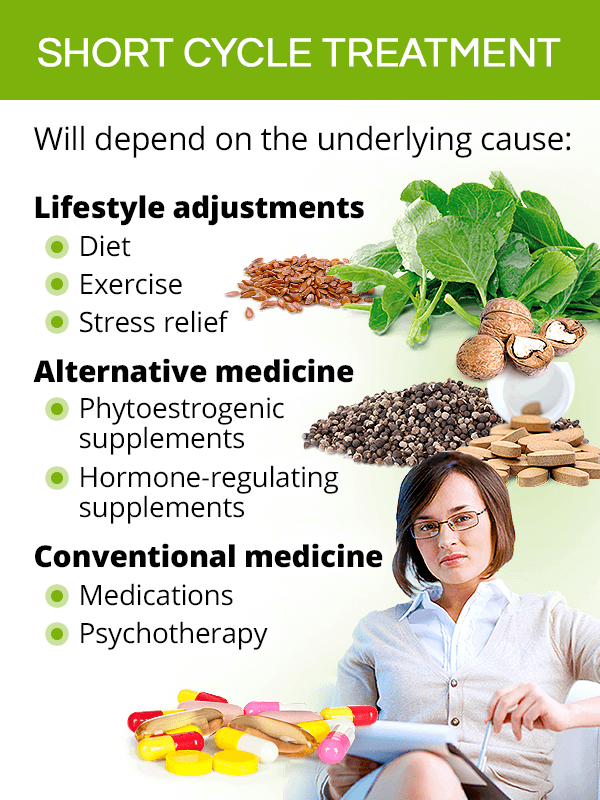
It is important to mention that sometimes short period cycles are a woman's norm and do not require treatment as long as potential underlying causes have been ruled out.
For those whose short cycles are indeed result of unhealthy lifestyle practices or unresolved medical conditions, treatment will mostly be aimed at controlling that underlying cause and relieving hormonal imbalance. It can include the following:
Lifestyle Adjustments
A balanced diet that is rich in foods that contain phytoestrogens and iron, such as flax, spinach, nuts, and lentils
Regular exercise that consists of moderate-intensity workouts for 150 minutes a week6
Stress-relief techniques that includes deep breathing exercises, meditation, or yoga
Alternative Medicine
Nutritional supplements, like iron, to resolve deficiencies that might be behind frequent menstruation
Phytoestrogenic supplements, like chaste berry, to promote hormonal balance by supplying plant-based estrogen
Hormone-regulating supplements, like Macafem, which nourish the endocrine glands into optimal hormone production
Conventional Medicine
Medications, such as birth control pills, might be prescribed to reduce menstrual flow and lengthen the cycle
Psychotherapy is recommended to those with eating disorders or anxiety that might provoke period issues
Key Takeaways
Without a doubt, suffering from polymenorrhea can take a toll on women's quality of life. It is defined as having cycles shorted than 21 days, which translates to more frequent menstruation throughout the year. While short menstrual cycles are not generally accompanied by other symptoms, they might be present alongside other ailments characteristic of their root cause, such as cramps, hot flashes, or fatigue. Most of those causes are hormonal and brought about by medical conditions, like PCOS or thyroid diseases, or lifestyle practices, like excessive stress or exercise. Because of an increased risk of anemia, infertility, and miscarriage associated with short menstrual cycles, they should be promptly evaluated and treated with a combination of wholesome practices of diet, exercise, or stress-relief; herbal supplements; and conventional medicine aimed at managing underlying conditions. With a little initiative, long-lasting menstrual balance is within reach!
Sources
- American Family Physician. (2004). Abnormal Uterine Bleeding. Retrieved December 5, 2019 from https://www.aafp.org/afp/2004/0415/p1915.html
- Mayo Clinic. (2019). Menstrual cycle: What's normal, what's not. Retrieved December 5, 2019 from https://www.mayoclinic.org/healthy-lifestyle/womens-health/in-depth/menstrual-cycle/art-20047186
- NHS. (2019). Periods and fertility in the menstrual cycle. Retrieved December 5, 2019 from https://www.nhs.uk/conditions/periods/fertility-in-the-menstrual-cycle/
- npj Digital Medicine. (2019). Real-world menstrual cycle characteristics of more than 600,000 menstrual cycles. Retrieved December 5, 2019 from https://www.nature.com/articles/s41746-019-0152-7
- Office on Women's Health. (2018). Menstrual Cycle. Retrieved December 5, 2019 from https://www.womenshealth.gov/menstrual-cycle/your-menstrual-cycle
Footnotes:
- The Society of Obstetricians and Gynaecologists of Canada. (n.d.). Menstrual Cycle Basics. Retrieved December 5, 2019 from https://www.yourperiod.ca/normal-periods/menstrual-cycle-basics/
- The Center for Young Women's Health. (2018). Menstrual Periods. Retrieved December 5, 2019 from https://youngwomenshealth.org/2010/04/21/menstrual-periods/
- Cleveland Clinic. (2019). Abnormal Menstruation (Periods). Retrieved December 5, 2019 from https://my.clevelandclinic.org/health/diseases/14633-abnormal-menstruation-periods
- Elmaogullan, S. (2018). Abnormal Uterine Bleeding in Adolescents. Retrieved December 5, 2019 from https://www.ncbi.nlm.nih.gov/pmc/articles/PMC6083466/
- Indian Journal of Endocrinology and Metabolism. (2013). Luteal insufficiency in first trimester. Retrieved December 5, 2019 from https://www.ncbi.nlm.nih.gov/pmc/articles/PMC3659905/
- American Heart Association. (2018). American Heart Association Recommendations for Physical Activity in Adults and Kids. Retrieved December 5, 2019 from https://www.heart.org/en/healthy-living/fitness/fitness-basics/aha-recs-for-physical-activity-in-adults
